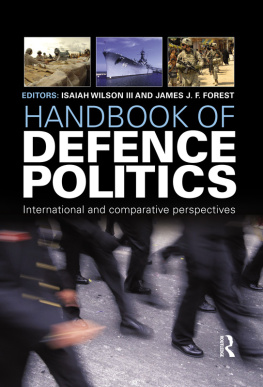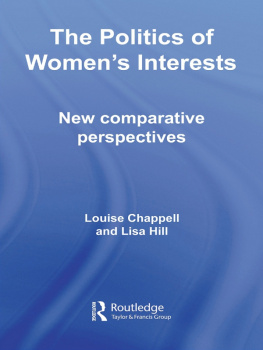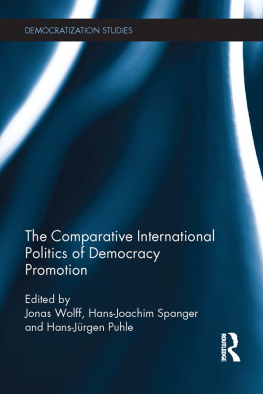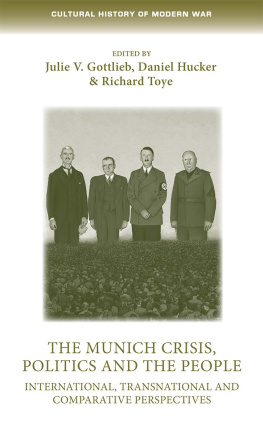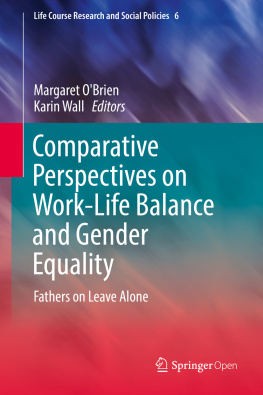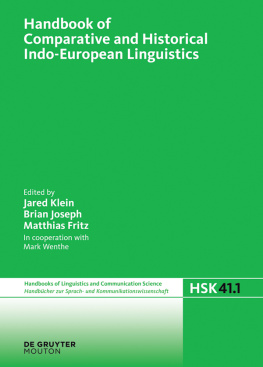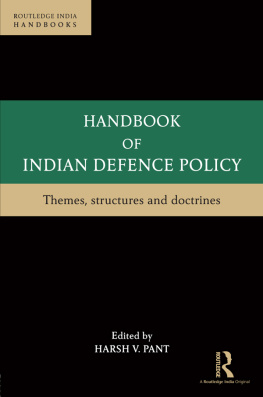First edition 2008
Routledge
Albert House, 14 Singer Street, London EC2A 4BQ, United Kingdom (Routledge is an imprint of the Taylor & Francis Group, an informa business)
Routledge 2008
All rights reserved. No part of this publication may be photocopied, recorded, or otherwise reproduced, stored in a retrieval system or transmitted in any form or by any electronic or mechanical means without the prior permission of the copyright owner.
ISBN 978-1-85743-443-9
Europa Development Editor: Cathy Hartley
The publishers make no representation, express or implied, with regard to the accuracy of the information contained in this book and cannot accept any legal responsibility for any errors or omissions that may take place.
Preface
Issues of defence politics and policy have long been at the forefront of political agendas and international affairs. However, the dramatic changes to the global system that have taken place since the end of the Cold Warand particularly since the terror attacks on the US homeland on 11 September 2001have amplified the worlds attention towards political and policy issues of national, regional and global security. This volume thus provides an in-depth analysis of the fundamental causes ofand defence policy responses tothis new post-9/11 security environment. The chapters provide thoughtful and balanced insights on key contemporary issues of concern to defence policymakers, and a comparative approach permits an understanding of multifaceted subjects from a range of perspectives. Many of the authors address both external and internal influences of a nations defence politics, often considering critical issues and challenges from a dynamic process perspective. We are convinced that this approach provides a more sophisticated understanding of the complex reality of contemporary defence policymaking.
Following a brief introduction and review of the most salient literature on defence politics, the chapters are presented in four sections: international dimensions, regional and domestic considerations, US-specific issues and future perspectives. Maps and data tables are included at the end of the volume to amplify and enhance the chapter discussions.
Part I: International Dimensions
The first part of the volume offers several theoretical essays and critical analyses of issues that transcend geopolitical boundaries. In the first chapter of this section, Aidan Hehir examines the contemporary controversy surrounding the notion of self-defence by initially charting its theoretical genesis and practical manifestation in international law, with a particular focus on the impact of the 1945 UN Charter. He describes how the US-led response to the 2001 terrorist attacksthe invocation of the Bush Doctrinechallenged existing legal frameworks and constituted an explicit attempt to radically alter the doctrine governing self-defence. However, he also argues that this dispensation pre-dates the Bush Administration and derives to a large extent from the structural changes wrought by the end of the Cold War and the subsequent emergence within the West of an internationalist outlook comprising a redefined and broadened understanding of national security. He concludes with some thoughts on the potential implications of the contemporary radical conception of self-defence, arguing that it risks destabilizing the international order and increasing the insecurity of those states which adopt this aggressive defensive posture.
Next, Scott Silverstone examines how two external events, separated by 50 yearsthe attack on Pearl Harbor in 1941, and the 1991 Gulf War against Iraqwere decisive in giving normative meaning in American domestic politics to the ambiguous status of preventive war. The first produced indelible symbols of aggressive war, Imperial Japan and Nazi Germany, and the Nuremberg and Tokyo war crimes trials which explicitly criminalized preventive war as raw aggression and contrary to the very meaning of civilized behaviour, while the second produced a surge of American confidence in the effectiveness of military force to counter a rogue state. In turn, the normative and strategic glow of the Gulf War provided a powerful model for those political actors pushing preventive attack as a legitimate measure of self-defence in the domestic political struggle to shape US policy towards North Korea a few years later, and towards Iraq once again after 9/11. Finally, he concludes that the Iraq war of 2003 and its aftermath will undoubtedly serve as a powerful international event that will shape the domestic politics of preventive war in important ways. At the international level, the rancorous split between the US and much of the international community over going to war demonstrated that the shift towards conceiving of preventive war as a form of legitimate self-defence is largely confined to the US; this does not mean, however, that the Iraq war will produce a swing back towards the belief that preventive war is criminal aggression.
Then Alexandre Lambert explores the notion of democracy by force, which has been associated with the post-9/11 Bush Doctrine. According to the concept of democratic peace, as first formulated by the German philosopher Immanuel Kant in 1794 in his writing On Perpetual Peace, democracies do not wage war against each othera trend supported by the presumption of the positive effects of liberal democracy and market economy on international peace and stability. In response to 9/11, the Bush Administration dramatically transformed the promotion of democracy, which became closely intertwined with the international fight against terrorism. After reviewing key changes in the international security environment in the post-Cold War and post-9/11 era, Lambert analyses the characteristics and impacts of asymmetrical threats and the rise of non-state actors in contemporary international security, and then assesses both the syndrome and anatomy of failed states as one of the most pressing concerns in international affairs. Next, he discusses past and present democracy-promotion strategies by taking into account new regional and sub-regional trends beyond Europe, including in the Americas and Africa, and further assesses some of the current challenges of the US-led war on terror and its development from pre-emptive military action towards preventive warfare. Finally, his chapter concludes with an assessment of why the post-9/11 democracy by force policy itself has failed and offers recommendations for the future involvement of the military in democracy promotion abroad.
The next three chapters of this section address various aspects of collective security. First, Erica Chenoweth explores recent proposals for the establishment of a global counter-terrorism bodyan entity which could enhance co-ordination and co-operation among nations regarding the threat of domestic and transnational terrorismor at least some form of collective security agreement against terrorist acts. Her chapter challenges these proposals by comparing the viability of different models of security collaboration with regard to the terrorist threat. While terrorism is clearly not the only transnational threat faced by states today, this analysis provides a useful case study of how states navigate the politics of collective action when confronting such threats. She concludes that the unique nature of terrorism prohibits the successful operation of international institutions or collective security arrangements designed to reduce the threat. Instead, states should resort to flexible, bilateral or multilateral counter-terrorism alliance arrangements on a state-by-state basis.


